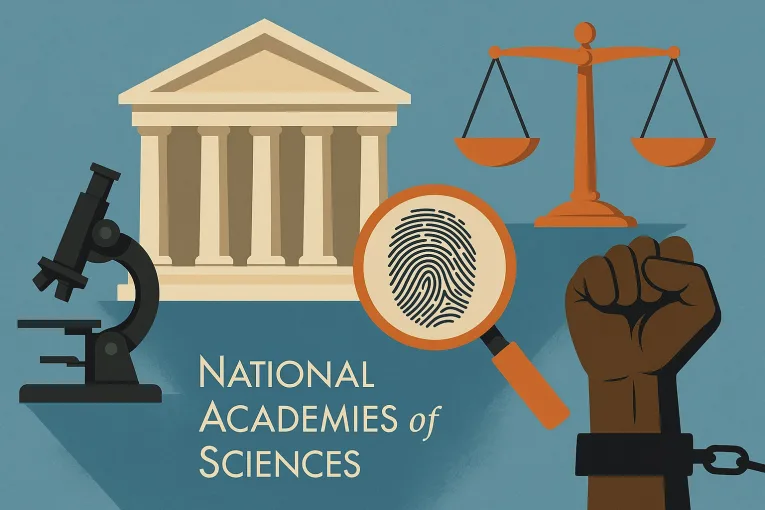
Generated Image
New report from National Academies of Sciences calls for data transparency and racial equity in prosecution.
A new report from the National Academies of Sciences, Engineering, and Medicine lays out a roadmap for transforming prosecution in the United States, focused data transparency, racial equity, and diversion from incarceration.
The report, Examining Prosecution: Proceedings of a Workshop, summarizes findings from a September 2024 convening of national experts, prosecutors, researchers, and advocates, and underscores the critical, yet often overlooked, role that prosecutors play in shaping the outcomes—and inequities—of the U.S. criminal legal system.
“Prosecutors increasingly recognize their power, influence, and discretion as possible levers to mitigate racial disparities in the criminal legal system, the growth of incarceration, and incarceration of innocent individuals,” said workshop chair Preeti Chauhan of John Jay College of Criminal Justice in her opening remarks.
The workshop focused on highlighting practices that reduce racial and ethnic disparities, offer alternatives to incarceration, and promote accountability and community trust. Importantly, it sought to center racial and economic fairness in prosecutorial decision-making, an area of the justice system long considered a “black box” resistant to transparency and research.
One of the central themes of the workshop was the growing use of diversion programs to reduce incarceration without compromising public safety. In multiple jurisdictions, studies show that diverting individuals—particularly those facing nonviolent charges—can substantially reduce recidivism.
Amanda Agan of Cornell University presented research from Suffolk County, Massachusetts, showing that individuals who were not prosecuted for low-level nonviolent misdemeanors were 58% less likely to face a new criminal complaint over the next two years. Among those who completed diversion programs, felony complaints dropped by an astonishing 75%.
These findings were echoed in San Francisco, where researchers found that felony diversion programs reduced the likelihood of reconviction, even among individuals with serious criminal histories.
“Diversion appears to be more effective at reducing recidivism than traditional case adjudication,” concluded UC Berkeley’s Steven Raphael.
The report also examines how prosecutorial discretion can either reinforce or reduce racial disparities. In Florida, for example, researchers found that Black defendants were more likely to receive prison sentences than white defendants, even when controlling for case characteristics.
However, in jurisdictions led by “progressive prosecutors,” racial disparities in outcomes were significantly reduced.
In North Carolina, a longitudinal study tracked how prosecutorial charging decisions affected incarceration. From 1995 to 2010, prosecutors were less likely to reduce charges for Black defendants when it would help them avoid mandatory prison—a practice that compounded racial disparities.
But by 2014–2019, prosecutors were more likely to reduce charges for Black defendants, suggesting an offsetting effect that contributed to the broader decline in racial incarceration gaps.
“Prosecutors can fill prisons, destroy lives, and exacerbate racial disparities,” noted University of Maryland’s Brian D. Johnson. “But they also have the power to do the opposite.”
Several presenters emphasized the importance of building data culture within prosecutors’ offices. Prosecutorial Performance Indicators (PPI), community dashboards, and public reports on racial equity are increasingly being used to foster transparency and accountability.
Kimberly Foxx, State’s Attorney for Cook County, described how declining to prosecute low-level drug offenses reduced the number of such cases referred by police, as law enforcement adjusted to the new policy. “Doing nothing,” she said, “can be more impactful than performative diversion programs.”
GRO Community in Chicago launched an innovative gun diversion program that uses therapy and cognitive behavioral strategies to serve young men—most of them Black—arrested for unlawful gun possession. “Most of these men are just trying to protect themselves or their families,” said GRO’s Aaron Mallory. Of 73 participants, 63 completed the program, and those who did had significantly lower arrest and conviction rates.
While the report highlights recent advances, it also cautions that much more research and structural reform is needed.
“The overall evidence base for best practices in prosecution and policy recommendations remains underdeveloped,” said Johnson. The workshop calls for expanded partnerships between researchers and prosecutors and increased investment in data infrastructure and accountability mechanisms.
Ultimately, the report underscores that prosecution is not just a legal function but a moral and political one.
As Shaffer noted, “An execution says more about us as a society than it does about the person condemned.”
The same, the workshop suggests, could be said for prosecution. When wielded thoughtfully, prosecutorial discretion can be a powerful tool for justice.
Categories:
Breaking News Everyday Injustice
Tags:
Amanda Agan Dart Center for Journalism and Trauma Data Transparency Diversion from incarceration Kimbrel Miller National Academies of Science Preeti Chauhan Progressive Prosecutors Prosecutors Racial Equity Steven Raphael
This post was originally published on this site be sure to check out more of their content.






